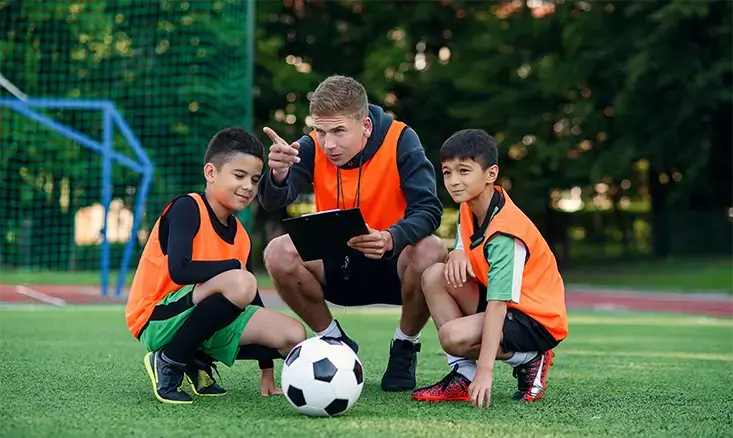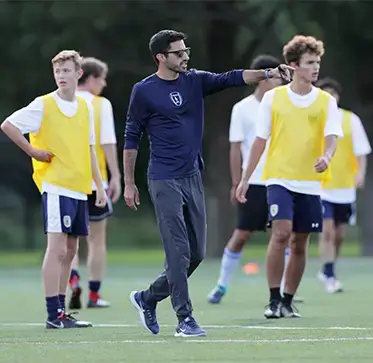CRFC BLOGS
LATEST BLOGS & NEWSLETTERS
Why Professional Coaches Are Essential for Youth Soccer Camps
When it comes to youth soccer camps, the role of a professional coach is more than just leading drills or calling out instructions. Professional coaches are an essential part of the camp, offering knowledge, skill development, and leadership that go far beyond the field. Professional coaching can make all the difference if a young player is just starting or looking to take their skills to the next level.
1. Expert Knowledge and Experience
Professional coaches bring years of experience, both as players and as instructors. Their understanding of the game is deeply rooted in technical skills, tactical awareness, and psychological strategies. This expertise allows them to break down complex skills into easy lessons for young players.
Professional coaches have seen all levels of soccer play and can offer valuable insights into what it takes to succeed at each stage of development. They also assess a player’s strengths and weaknesses and design drills to individual needs, which can be difficult for less experienced instructors to do effectively.

2. Structured Skill Development
A professional coach ensures that soccer camps have a clear, structured plan. This structure helps young players progress from basic techniques, like passing and shooting, to more advanced strategies, like positioning and reading the game. Campers develop a complete understanding of the game with a professional coach guiding them.
These structured programs ensure that each practice session is meaningful, with every drill designed to target specific skills. Coaches also keep track of individual progress, offering feedback and adjusting the program as needed to keep players on track.
3. Safe and Supportive Environment
Soccer can be a physically demanding sport, especially for young players. A professional coach is trained not only in the fundamentals of the game but also in safety protocols. They understand how to guide players through warm-ups, manage injury prevention, and offer encouragement in a safe, supportive environment.
Moreover, professional coaches know how to balance competition with fun. They encourage players to challenge themselves while emphasizing the importance of teamwork, respect, and good sportsmanship. This creates an environment where players feel safe to make mistakes, take risks, and enjoy the process of learning.

4. Mental and Emotional Development
Professional coaches do more than just teach soccer techniques—they also help shape a player’s mindset. Young players are often under great pressure, and a professional coach can provide crucial support in helping them build mental resilience. Coaches teach players to overcome setbacks, stay focused during challenging moments, and develop a positive attitude toward wins and losses.
Professional coaches help players build confidence, manage stress, and improve their decision-making on and off the field. These lessons extend beyond soccer, contributing to a young player’s personal growth.
5. Creating a Positive and Competitive Atmosphere
Professional coaches know how to strike the right balance between competition and fun, creating an atmosphere that motivates players to do their best while still allowing them to enjoy the game. They encourage healthy competition and teach players to set and achieve goals.
This environment in a youth soccer camp motivates players to push their limits while promoting sportsmanship and teamwork. The result is an experience that challenges each player while also developing a love for the sport.

6. Role Models and Leadership
Professional coaches serve as powerful role models for young soccer players. Through their work ethic, attitude, and commitment to the game, they show campers what it means to be a leader both on and off the field. Coaches emphasize dedication, integrity, and resilience, teaching players valuable life lessons.
The leadership of a professional coach can help players understand the importance of discipline and perseverance. It is not just about playing the game—it’s about respecting the process, working hard, and staying focused on long-term goals.
7. Developing a Love for the Game
A professional coach can ignite a passion for soccer that lasts a lifetime. By making the game fun, challenging, and rewarding, coaches inspire players to keep playing, practicing, and improving. They create an environment where players develop skills and learn to love the sport for its beauty, strategy, and excitement.
8. Long-Term Player Development
For many young players, soccer camps are just the beginning of their journey. Professional coaches can help players set long-term development goals, guide them through the next steps in their training, and provide the tools they need to reach the highest levels of play. Whether the goal is to make a school team or pursue a professional career, a professional coach provides the mentorship and guidance necessary to reach those dreams.

Conclusion
Professional coaches are more than just instructors; they are mentors, leaders, and motivators who profoundly impact young soccer players. At youth soccer camps, these coaches are crucial in providing structured, skillful, and supportive environments where players can thrive. Their experience, expertise, and leadership set the foundation for success and personal growth. For any young soccer player looking to take their game to the next level, the guidance of a professional coach at CRFC is essential.
FAQs
Why are professional coaches important in youth soccer camps?
Professional coaches provide expert knowledge, structured training, and personalized guidance. They help young players improve their skills and grow on and off the field.
How do professional coaches help with skill development?
They create structured training plans, teaching players basic techniques and advanced strategies step-by-step. Coaches also give feedback and adjust the training to match each player’s progress.
Do professional coaches focus only on soccer skills?
No, they also teach life skills like confidence, teamwork, and mental resilience. Coaches help players handle pressure, overcome challenges, and stay motivated.
What kind of environment do professional coaches create?
They ensure a safe, supportive, and fun atmosphere. Coaches encourage competition while promoting teamwork, respect, and good sportsmanship.
How do professional coaches inspire young players?
Coaches act as role models, teaching dedication, discipline, and a love for the game. They motivate players to work hard and aim for their long-term goals.

Did you find this useful?

